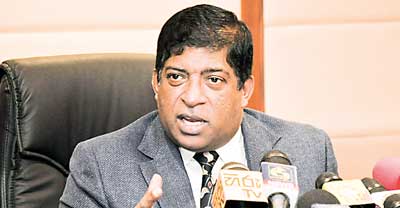Thursday Feb 19, 2026
Thursday Feb 19, 2026
Friday, 25 November 2016 00:43 - - {{hitsCtrl.values.hits}}
By Charumini de Silva
The Government’s ambitious plan to establish an International Financial Centre (IFC) in Colombo is in the offing as it will be tabled in Cabinet within the next two weeks.
“In the next week or two we will get it to Cabinet and we will ensure it through Parliament to be ratified by end of January,” Finance Minister Ravi Karunanayake told journalists. 
To establish the IFC, the Government will draw up new regulations covering banking and financial transactions, company law, recruitment and employment rules, arbitration laws and all special regulations and laws needed. He said the IFC will be located in the Financial City, which is currently being constructed by the China Harbour Engineering Company (CHEC). However, he said that until the project is completed, the Financial Centre will kick-off as soon as the Act comes into effect.
“We are looking out for a particular private place to start off the International Financial Centre. A place which can offer us 50,000 to 60,000 square feet until the Financial City moves in about two to three years,” he explained.
The financial centre, which aims to be a rival to Dubai, Singapore and Hong Kong, hopes to attract investment to Sri Lanka and reduce brain drain by retaining professionals eyeing migration.
A financial centre is a location that is home to a cluster of nationally or internationally significant financial services providers such as banks, investment managers or stock exchanges. A prominent financial centre can be described as an international financial centre or a global financial centre and is often also a global city. An offshore financial centre is typically a smaller, low-tax jurisdiction that primarily serves non-residents.
International Financial Centres (IFCs) - such as London, New York, and Tokyo -are large international full-service centres with advanced settlement and payments systems, supporting large domestic economies, with deep and liquid markets where both the sources and uses of funds are diverse, and where legal and regulatory frameworks are adequate to safeguard the integrity of principal-agent relationships and supervisory functions.
In Asia, Singapore and Hong Kong have long been in competition to round off the top five financial centres in the world.
Finance Minister Ravi Karunanayake reiterated that the Central Bank will be restructured, claiming that the “unsuccessful” institution was responsible for the failed banks and finance companies witnessed in the recent past.
“How many banks and how many financial companies have crashed? It was within the role of the unsuccessful Central Bank. They tried to profess they are a saving the nation, but are part of the problem. It has been politicised,” the Minister charged yesterday, speaking at a special press briefing held at the Finance Ministry.
Noting that the Central Bank was a “sacrosanct” place, Karunanayake claimed the banking regulator was giving out “politically bias” information related to Government’s activities, which he said was the root cause for many problems.
He said the restructuring would be made to ensure better execution of the Central Bank’s responsibilities. “We are trying to ensure that they do the proper regulation.”
When asked if the institution is politicised now under the Unity Government as well as after the Bond scam, the Minister vehemently denied it, adding: “Absolutely not! You could see with performance.”
Karunanayake told Daily FT recently that the President and the Prime Minister would be spearheading the restructuring process. However he declined to give further details. (CD)
Finance Minister Ravi Karunanayake yesterday justified increased telecommunication and data charges, pointing out that it was a win-win approach for both Government and telecommunications operators in increasing revenue.
He said the major shift from voice to data has caused service providers a significant reduction in their revenue and called on the Government to consider their proposal to fix the situation.
“There was a big shift from voice to Whatsapp and Viber, which has caused a considerable drop in telecommunications service providers. So, this was a call from them. We wanted to bring it to a similar price level like in other countries,” Karunanayake told journalists at a special press briefing held at the Finance Ministry yesterday.
The telecommunication levy on internet services was increased to 25%, on par with other telecommunication services in the 2017 Budget.
He said the SIM Card Activation Levy (SCAL) of Rs. 200 per SIM was imposed to discourage the use of mobile connections temporary for fraudulent and criminal activities.
With regards to recently introduced traffic fines by the Government, the Minister asserted that basic awareness should be done through the Police and Transportation Ministry.
Karunanayake said the fines collected are not considered a major revenue source to the Government, insisting that it was imposed to minimise daily road accidents as well as to implement the rule of law.
While admitting that there could be instances where Police officers try to elicit bribes, he assured that the Government will introduce advanced technology so that won’t be any interaction between the offender and the relevant authority.
When reporters pointed out issues being raised related to signage and speed limits, Karunanayake said: “I agree with you, but the media must highlight and push more of those types of things. You are trying to whack the jockey, not the horse. So, get your attention on the horse.”